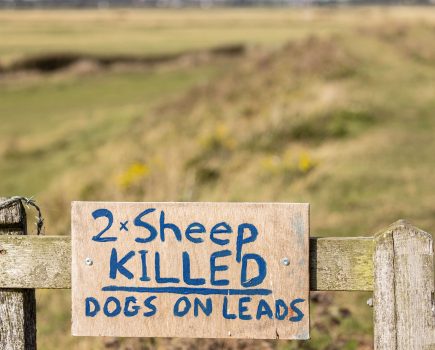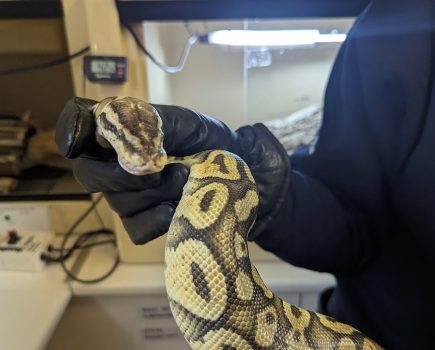Smallholders have a voice at national level. Mary Marshall, an expert in animal diseases, is on stakeholder groups consulted by Defra. But she talked to CS about her dissatisfaction with the process, and her belief that the concerns of small scale livestock keepers are not being heard.
A national smallholders’ representative has hit out at Defra for the way it is responding to the threat posed by animal diseases. Mary Marshall represents the online group Smallholders’ Forum, and is on some of the stakeholder groups consulted by Government. But she is frustrated by the way the consultation process is managed, and by many of Defra’s policies. In particular, she condemns Defra’s failure to adopt rapid on-site diagnostic kits for animal diseases, both to inform control strategies and to allow for safe movement of animals.Mary is calling for a more locally-based strategy for dealing with disease outbreaks and for the use of the diagnostic kits, under the supervision of the appropriate reference laboratories, at Animal Health Divisional Offices, private laboratories, and in veterinary practices. She is also unhappy at the disproportionate influence the NFU and agri-business have on Defra policy.
Lack of transparencyMary, a scientific researcher who has had her own smallholding, told CS: “There is a lack of transparency in the consultation process, and a lack of open and independent consultation feeding into decision making. Ever since 2001, members of various stakeholder groups have been asked to submit views. But little account seems to have been taken of these.“The members of the stakeholder groups I am in are not able to communicate amongst themselves. There is no list of participants or contact details, so we can’t share information. There are so many different stakeholder groups, with different compositions, that true consultation is impossible. Minutes are rarely distributed, so there is no open record. I suspect that even Defra staff are unaware of the contributions made by participants at meetings that they do not attend.”Mary said that initially meetings were held in London, but now there are telephone conferences. “These are even less transparent. You don’t know who else is on the line. There is no real discussion – it is all very much managed by Defra. “Real decisions appear to be taken by Defra in consultation with small invited ‘core’ stakeholder groups whose members are mainly from the commercial livestock sector,” said Mary. “These decisions are then communicated to the ‘general’ stakeholder groups, whose function, apparently, is simply to transmit these policy decisions to those whom they represent. Questions and challenges are not encouraged, and when made they do not elicit any meaningful discussion. Often, a challenge to a proposed policy is followed the next morning by an official announcement of that policy, accompanied by a statement that ‘stakeholders’ or ‘industry’ have been consulted.”
DIAGNOSTIC KITS REJECTEDMary said her particular interest is in diagnostics. “In 2001, the US Department of Agriculture’s Agricultural Research Service offered to the UK a rapid onsite diagnostic kit. This was rejected and the reasons have never been satisfactorily explained. This is very worrying. This technology is terribly important.” She said the issue has become even more important now there is consultation with farmers on sharing the costs of controlling animal diseases.“Defra’s responsibility is to prevent and rapidly detect the first instance of a notifiable disease and then to prevent or control its spread. This should be done effectively (using up-to-date technology), proportionately (preserving food security), and humanely (respecting both human and animal welfare).“Shortcomings in Defra’s ability to prevent and rapidly detect infection are evident. Animals are imported on the basis of clinical inspection, even though sub-clinical infection would have been detected by virus testing. Government-licensed laboratory facilities have not been adequately funded and maintained, with disastrous consequences such as the 2007 FMD virus escape and local spread from Pirbright that should not have led to a national emergency with serious long-term losses.“There has to be a sharing of responsibility as well as cost. Once an outbreak of notifiable disease has been officially confirmed, portable rapid diagnostic kits should be available nationally to livestock keepers through their veterinary practitioners. “There are a variety of diagnostic kits available now, and more powerful ones are being developed. We should not wait for the latest promising device to be ‘validated’. Instead, kits that are now available and being used in other countries should be accessible here as the valuable tools that they are, alongside clinical inspection. There is no single perfect diagnostic test; one test may be useful for a particular purpose while another is useful for a different purpose. If considered necessary, they can be used in parallel with other already accepted diagnostic tests, where their use would increase as confidence in them increases.”
KITS facilitate controlMary said that if local veterinary practices were allowed to use diagnostic kits, a poultry owner who had a sick bird could take a swab, put it into a disposable cartridge that can be disinfected and then take the cartridge to the veterinary practice where it could be tested for disease within 20 minutes. There would be no risk of cross contamination, and results could be transmitted to Defra and the reference labs in real time.“These kits allow for rapid identification of disease, which would facilitate control. And, if disease is not present, they should facilitate the safe movement of animals.“The only current exceptions to the monopoly of the national reference laboratories are for certain equine notifiable diseases. Private laboratories are already permitted by Defra to perform tests as a commercial service, using commercially available kits, on condition that any positive results must be reported to Defra. Why can this not be extended for other species and diseases?“Defra often justifies its failure to change its policies because of EU or OIE regulations. It is possible to change these regulations, but it takes the political will to do so and a transparent approach to consulting with stakeholders.
POWER OF AGRI-BUSINESS“One of my other complaints is that the NFU has a disproportionate voice in decision making. There is no way diseases can be controlled if you only consider the intensive commercial sector. If priority is given to trade considerations in determining control policies, should those sectors that place more value on local production, and yet have less input into decisions, be forced to share the costs when disease is introduced or is spread as a consequence of trade, or when vaccination is rejected because it would hamper trade?“It is quite right that the NFU should play an important role, but it should be remembered that the commercial sector is well funded and therefore over-represented at meetings both in London and Brussels. Small scale livestock keepers are a disparate group, with varying priorities, and have little time or funding to participate actively in Defra meetings or consultations. A mechanism for them to co-operate and speak with a more powerful voice would be a major step forward. But, sadly, Defra’s stakeholder consultations and communication policies do not facilitate this approach. Some people label Defra’s strategy as ‘divide and rule’.” Mary said a study of ‘grey agriculture’ was included in an invited paper she wrote for the World Organisation for Animal Health on biological disasters of animal origin. This paper was written on behalf of stakeholders to underline the role that all sectors play in disease control (this paper is available online at: http://www.oie.int/eng/publicat/ rt/2501/A_R2501_MARSHALL.htm).She said that in the case of controlling avian flu, for example, it should be made attractive for all poultry keepers to register their birds, and that they should be able to register, if they prefer, with their local vet or a breed association, rather than with Defra. “There should be clear benefits in registering, and there should be options on what to do in the event of a disease. The government should provide rapid availability of protection for the people who keep poultry and allow their animals appropriate and safe options of vaccination, isolation or slaughter. If slaughter is chosen, reasonable compensation has to be considered. If isolation, the facilities need to be constructed and approved. All this could be organised in advance, instead of Defra going from door to door, which is absurd.“At meetings, Defra has said that it would be difficult to manage such a large database. But it should not be necessary for all the information to be kept centrally by Defra – we know the Government has problems in safeguarding data.
WHO PULLS THE STRINGS?“The basic point is that, in consultations, Defra should include a wider range of international and independent experts, as a check and balance, and to provide constructive challenges. The groups should not be divided into narrow concerns, but should include a mix of scientists and veterinary representatives together with those from a wide spectrum of livestock and companion animal keepers.“But the situation is even more complicated. The government and Defra have set up a maze of groups that feed into policy advice and decision making, such as Expert Groups, the Science Advisory Council, the England Implementation Group, and numerous and costly ‘consultancy reports’. The composition of these groups is not transparent. Nor is it obvious who really pulls the strings – Defra, Ministers, the Treasury or the Cabinet Office.“A lot of us are depressed. When you look at what is happening with bluetongue, it is absolutely ridiculous. If we are not careful, we risk losing traditional food production.”Mary Marshall suggests that for up-to-date information and for access to a wide variety of views, a good source is www.warmwell.com. She suggests www.promedmail.org for disease information selected and moderated by independent international experts. CS we will be inviting Defra to respond to the points made in this article.Speaking for youMary Marshall joined stakeholder groups when she started a campaign to stop camelids being included in culls during the foot and mouth outbreak in 2001. She has a background in medical and agricultural scientific research, and had a smallholding in Kent at the time of the outbreak, keeping llamas and other livestock. Mary, who now lives in Herefordshire, also joined the US Animal Health Association, gaining access to scientific research in the States.She was then invited by the Institute for Animal Health at Pirbright to join an EU-funded project on the control of animal diseases. She was representing stakeholders – including smallholders, livestock owners, scientists and vets – and is currently writing a final report for the project, which she said would be “hard-hitting”. Mary is also a rapporteur for ProMED-mail, the global electronic reporting system for outbreaks of emerging infectious diseases (www.promedmail.org). She recently organised a workshop in Brussels attended by international researchers and members of the livestock sector.







